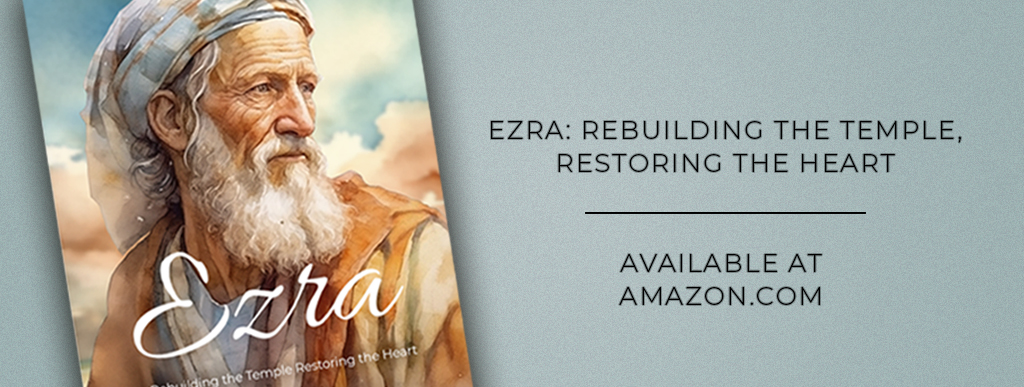Ezra Bible Study Week 6 Part 2
Are you looking for the other posts in this study? Click here for the table of contents.

Concluding Thoughts on Chapter 9 – Don’t Waste the Grace You’ve Been Given
It was grade three. I was 8 years old, and I had to have it. Helga Kunz had a miniature stapler with a box full of staples, and I had never seen anything so cute in my life. And so I waited, until the rest of the kids left the classroom for lunch, before slipping it into my pocket and leaving the school.
Here’s the thing about stealing–it’s a two-for-one deal, in which every object comes with a big dose of guilt. Sure enough, that guilt weighed me down as I walked home for lunch. Overwhelmed with the shame of my sin, there wasn’t a chance I’d enjoy what I took. In fact, as the hour dragged on, I only felt worse.
Desperate to free myself of this sin, I slipped on my jacket, rushed back to school, and put it back in her desk.
As I got to thinking about that today, I was reminded of Ezra Chapter 9, and how the weight of their sin brought Ezra down to his knees.
And when I heard this thing, I rent my garment and my mantle, and plucked off the hair of my head and of my beard, and sat down astonied. (Ezra 9:3, KJV)
Shame is a God-given response to our guilt, that reminds us that there’s no peace apart from Christ. Our conscience is there to remind us of the danger of sin, the way heat warns us of the danger of fire. This chapter illustrates the path to freedom as Ezra falls to his knees ashamed before God, and repents for the sin of his people,
O my God, I am ashamed and blush to lift up my face to thee, my God: for our iniquities are increased over our head, and our trespass is grown up unto the heavens. (Ezra 9:6, KJV)
The Holy Spirit convicts us of sin. What we do in response will determine the choice that we made to either serve Christ or to stay in the sin that we’re in. It’s never too late to repent, to let go of the burden of sin, and find peace in the arms of our Savior.
Answer Key Chapter 9
- What was the accusation raised against the people of Israel including the priest and the Levites?
They had not separated themselves from the people of the lands, doing according to their abominations. - Who led the way (or who was chief) in this unfaithfulness?
The leaders and the officials. - What was intermarriage with these other people symbolic of?
A believer returning to sin. - Was intermarriage the only problem they had?
No. They were also engaging in the sinful lifestyle and detestable practices of their neighbors. - What did Ezra do when he heard about the sinful accusations?
He tore his garment and his robe, and plucked out some of his hair and beard, and sat down astonished. - What does the Jewish word “Kriah” mean, and what is it symbolic of?
The word “kriah” means tearing. It’s a tradition of rending garments that represents the tear in your heart. - What does Romans 12:2 tell us about separating ourselves from the world? Write the verse out here.
And be not conformed to this world: but be ye transformed by the renewing of your mind, that ye may prove what is that good, and acceptable, and perfect, will of God. - What does 2 Corinthians 6:14 teach us about separating ourselves from the world? Write the verse out here.
Be ye not unequally yoked together with unbelievers: for what fellowship hath righteousness with unrighteousness? and what communion hath light with darkness?
Note: It’s not saying that we can’t be friends with people outside of our faith, but that we shouldn’t be intimately united with them. While this is particularly important when choosing a spouse, it’s also telling us not to walk in lock-step with the world. - Are you still engaged with any sin from your past? Is there sin in your life that you haven’t completely let go of? If so, what is it and what should you be doing about it?
This answer will be different for everyone. - When Ezra grieved over the sin of the people, he typified the Holy Spirit who grieves when we sin. What are some things that grieve the Holy Spirit? See Ephesians 4:25-32, and list them in your own words:
Lying
Sinful anger
Stealing
Unwholesome talk
Bitterness
Wrath
Anger
Fighting
Slander
Gossip
Concluding Thoughts on Chapter 10 – It Only Takes a Spark
As I’m reading this chapter, I gain a deeper understanding by looking at Matthew chapter 19 where Jesus said,
And every one that hath forsaken houses, or brethren, or sisters, or father, or mother, or wife, or children, or lands, for my name’s sake, shall receive an hundredfold, and shall inherit everlasting life. (Matthew 19:29, KJV)
You see, it’s one thing to say that we love God with all of our hearts, it’s another to put Him before anyone else.
Looking at holy men and women of God, we see Abraham willing to give up his son. We see Moses willing to give up the comforts of Egypt to suffer along with his people. We see Ruth giving up her people to follow the Lord. We see Hannah giving up her child. We see the 12 disciples who left everything behind to follow Christ.
Back to Matthew chapter 19, however, we see a young man who followed every commandment, but wasn’t willing to give up the one thing he loved most.
Jesus said unto him, If thou wilt be perfect, go and sell that thou hast, and give to the poor, and thou shalt have treasure in heaven: and come and follow me. But when the young man heard that saying, he went away sorrowful: for he had great possessions. (Matthew 19:21-22, KJV)
What we’re seeing in this chapter of Ezra is faith in action as God’s people are willing to give up the things they love most to return to the Lord.
Now, remember again, this chapter isn’t condoning divorce, and it’s not about race. It’s God way of teaching us to leave sin behind at all costs. They had not only married foreign women, they adopted their pagan lifestyle, both of which were strictly forbidden by God.
As we read this chapter, we need to be asking ourselves if we’ve truly left sin behind. Is there something we’re clinging to? Is there something or someone we have put before God?
For he that cometh to God must believe that he is, and that he is a rewarder of them that diligently seek him. (Matthew 10:39, KJV)
Answer Key Chapter 10
- What did Shechaniah suggest to Ezra, and what does this tell us about Shechaniah’s attitude at this time?
He said, “Now therefore let us make a covenant with our God to put away all the wives, and such as are born of them, according to the counsel of my lord, and of those that tremble at the commandment of our God; and let it be done according to the law.”
His readiness to turn away from sin illustrates his repentance. - Using Shechaniah’s example, what three steps should we take when we find ourselves caught up in sin?
Confess our sin.
Repent of our sin by turning away from it.
Restore a right relationship with God by living according to His law. - What hope could you give someone who has backslidden and wonders if they can return to the Lord?
This answer will be different for everyone. If you have trouble answering this one, remember these two verses:
For all have sinned, and come short of the glory of God; being justified freely by his grace through the redemption that is in Christ Jesus: (Romans 3:23-24, KJV)
If we confess our sins, he is faithful and just to forgive us our sins, and to cleanse us from all unrighteousness. (1 John 1:9, KJV)
In addition to these verses, The Parable of the Prodigal Son (in Luke Chapter 15) is a beautiful reminder of God’s love and incomparable grace. - The events we read about in this chapter are not an invitation to divorce an unbelieving spouse. In fact, the Bible tells us that God hates divorce (Malachi 2:16). These Jews were under the Levitical Law. As such, their example serves to teach us a spiritual lesson. Looking to 1 Corinthians Chapter 7, what reason does Paul give the church for staying with an unbelieving spouse?
In verse 16 Paul points out how we don’t know if staying with them might lead to their salvation. - What proclamation was issued throughout Judah? And what did Ezra do right before the proclamation was issued?
For all the exiles to assemble in Jerusalem. Anyone who failed to appear within three days would forfeit all his property.
Before the proclamation was sent, Ezra fasted and mourned. - When the people were assembled together, what were they told to do? And what was their response?To make confession unto the Lord, to do his will, and to separate themselves from the people of the land, including their strange wives.
Then all the congregation answered and said with a loud voice, “As thou hast said, so must we do.” - In the introduction I pointed out that the book of Ezra parallels the purification of one’s heart. Looking back at that chapter, what was the definition of the word purify?
According to Dictionary.com, the word purify means, “To make pure; free from anything that debases, pollutes, adulterates, or contaminates, or to free from foreign, extraneous, or objectionable elements.” - In what way were hearts purified in this chapter?
They separated themselves from their foreign relationships and sinful practices that polluted their faith. - Finally, looking back at Jeremiah 24:6-7 again, let’s remember once again why God brought them through this journey and to this final place. Write the verse out here:
My eyes will watch over them for their good, and I will bring them back to this land. I will build them up and not tear them down; I will plant them and not uproot them. I will give them a heart to know me, that I am the Lord. They will be my people, and I will be their God, for they will return to me with all their heart.
When you purchase a copy of the study guide, you’re actively supporting and strengthening our ministry as we spread the empowering message of the gospel to women across the globe!

We understand that not everyone can purchase the study guide, which is why we provide a printable version exclusively for those facing financial constraints. By subscribing below, you’ll unlock access to these downloadable materials. As part of our community, you’ll have the opportunity to explore the content at your own pace. Plus, as an added treat, you’ll receive periodic devotions from Time-Warp Wife, delivered directly to your inbox. Together, we can grow in faith and discover the abundant blessings of our shared journey. Join us in spreading the empowering message of the gospel to women all around the world.
FREE Printables – Autumn Scripture Cards
During the 6 weeks of the Bible study, I’ve created a set of Autumn-themed 4 x 4 inch scripture cards. There are 24 cards in total. Since this is our last week, these are the final 4.
Click here to view and print this week’s note cards.

